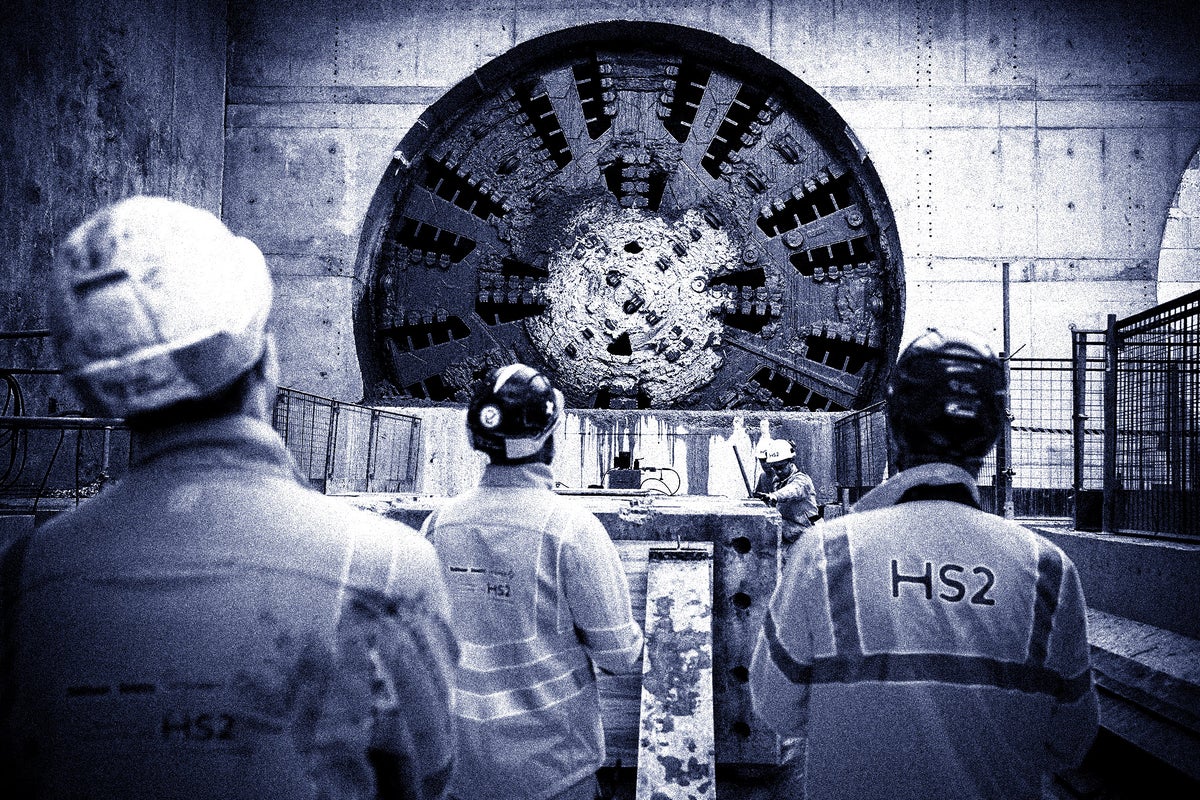
Rishi Sunak and Jeremy Hunt are in discussions about scrapping the second stage of the HS2 rail project as costs spiral amid severe delays.
A cost estimate, seen by The Independent, reveals that the government has already spent £2.3bn on stage two of the high-speed railway from Birmingham to Manchester but shelving the northern phase would save up to £34bn.
The documents, discussed at a meeting at No 10 on Tuesday headlined “chancellor and prime minister bilat”, suggest the £2.3bn is now not recoverable even if it is cancelled. The Independent understands talks are ongoing.
It comes as the chancellor tries to find more economic headroom as he faces growing pressure from Tory MPs to offer tax cuts before the next election.
The document, referring to a meeting between Sunak and Hunt, were snapped outside the Treasury on Tuesday— (Political Pics)
It would be a further blow to the beleaguered project that has already been cut back north of Birmingham, with a planned eastern spur to be built to Leeds now set to stop in the East Midlands.
The remaining parts of the project have been long-delayed amid soaring construction costs, with work now paused on the final stretch into London’s Euston station.
And the government’s own infrastructure watchdog in July warned the scheme was “unachievable”.
Press photographers posted outside the Treasury on Tuesday captured a glimpse of documents referring to a meeting between Mr Sunak and Mr Hunt.
The page included costings of each part of phase two, as part of a “savings table” noting how much each part is predicted to cost and how much money had been spent so far.
A government spokesperson said: “You would expect No 10 and the Treasury to regularly discuss large infrastructure projects.
“Spades are already in the ground on the HS2 programme, and we remain focused on delivering that.”
Mr Sunak was pressed on the issue at Prime Minister’s Questions on Wednesday by Tory MP Michael Fabricant who asked him directly if he would scrap phase 2 of the project.
Mr Fabricant, who raised the issue of disruption caused by work on the project in his Lichfield constituency, said: “Will the prime minister in the short term try and restructure HS2 so it works like a company should, and in the longer term can he save other constituencies by stopping HS2 at the end of phase 1?”
But the PM avoided directly answering the question.
The bill for phase 2a of the project, which goes as far as Crewe, has already received royal assent in parliament, meaning it would be hard to cancel it outright. The government's legislation for phase 2b into Manchester is currently in the report stage.
Government sources pointed to comments by Treasury minister John Glen in the Commons last week where he said the government remains “fully committed to delivering HS2 and the integrated rail plan”.
He added: “This is a long-term investment that will bring our biggest cities closer to each other. It will boost productivity, and will provide a low-carbon alternative to cars and planes for many decades to come.”
HS2 is expected to slash north-south intercity journey times and also release vast amounts of capacity for local train services on existing lines.
Trains on HS2 will travel at up to 225mph— (PA)
The project is currently set to be completed in stages from 2029 onwards, although it has faced continued delays. The first phase was originally due to open in 2026.
Labour, which is currently leading in the polls ahead of a general election due next year, has said it will complete the project in full.
Henri Murison, chief executive of the northern powerhouse partnership, said delays and cuts to the project so far amounted to “artificial savings that will cost taxpayers more in the long run”.
“If there were to be any further delays, particularly to phase 2b, in the north we’d be very annoyed about that,” he told The Independent.
“The fundamental problem is these changes are just making it more expensive so you’re not going to get the benefits as quickly and it’s going to cost more.”
Mr Fabricant said: “HS2 is a dysfunctional company unable to control its own budget. Its design is already out of date. Lichfield and other areas have already suffered economic damage as roads are closed and businesses are disrupted.
“This nonsense can’t be allowed to continue. The costs to our nation are way too high. It’s time to call an end to this failed project. It should end with phase one.”







